Generational Differences at the Workplace: An HR Report Analysis
VerifiedAdded on 2022/12/26
|5
|1502
|24
Report
AI Summary
This report, structured as a memo, explores the challenges and opportunities presented by generational differences in the workplace. It highlights the importance of understanding the diverse perspectives, communication styles, and work ethics of different generations, including Baby Boomers, Generation X, Millennials (Generation Y), and Generation Z. The report emphasizes how these differences can impact communication, lead to misunderstandings and conflicts, and affect team performance. It draws on research to identify key issues such as adapting to change, communication skills, and cross-departmental collaboration. The report recommends that organizations adopt strategies to manage a multigenerational workforce, including fostering understanding, promoting effective communication, and implementing training programs to bridge generational gaps. The report also provides recommendations for managers to identify individual strengths and weaknesses and set goals to improve organizational performance. The report references several articles to support its findings and recommendations. The report focuses on how to navigate generational differences to foster a more collaborative and productive work environment.
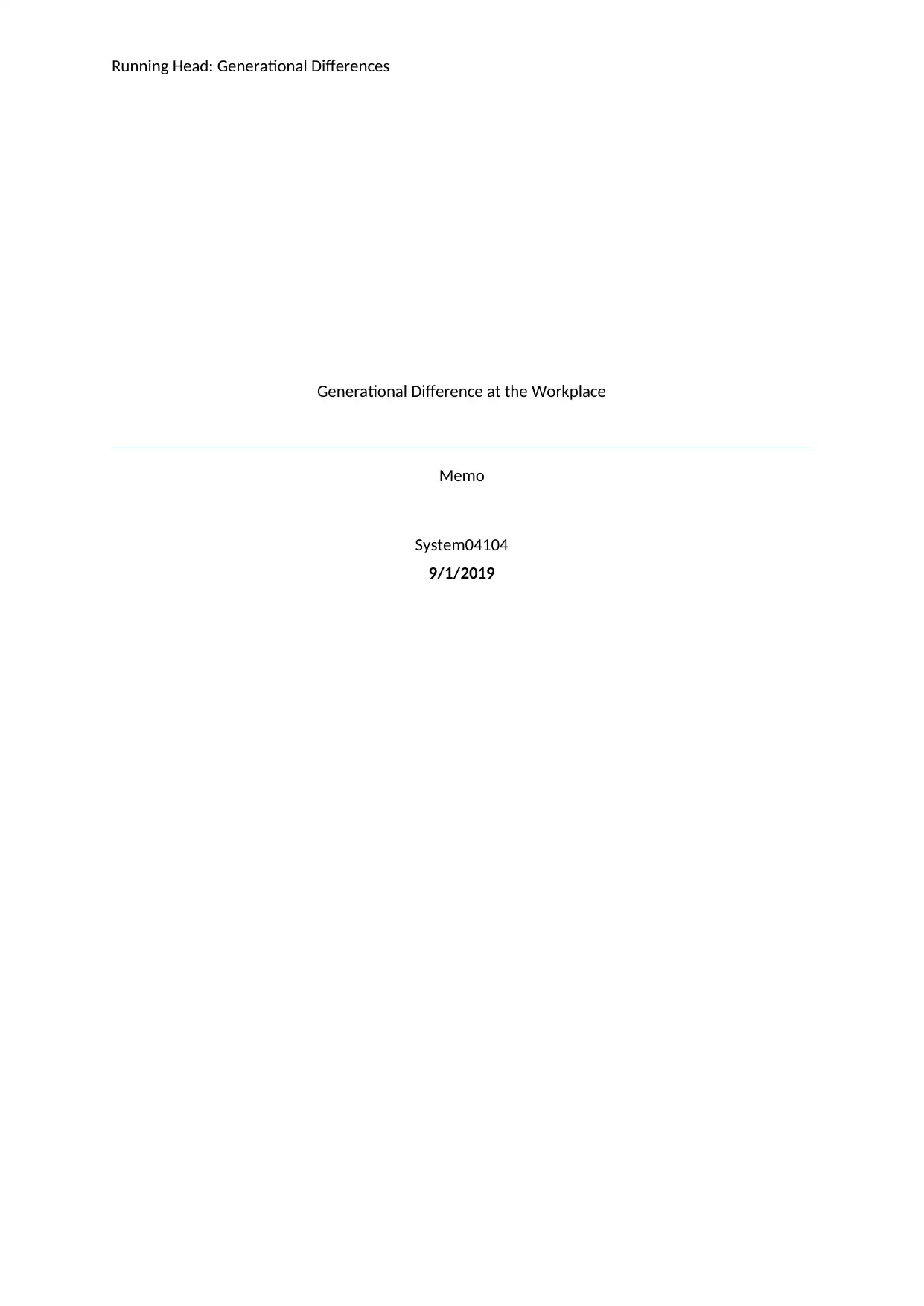
Running Head: Generational Differences
Generational Difference at the Workplace
Memo
System04104
9/1/2019
Generational Difference at the Workplace
Memo
System04104
9/1/2019
Paraphrase This Document
Need a fresh take? Get an instant paraphrase of this document with our AI Paraphraser
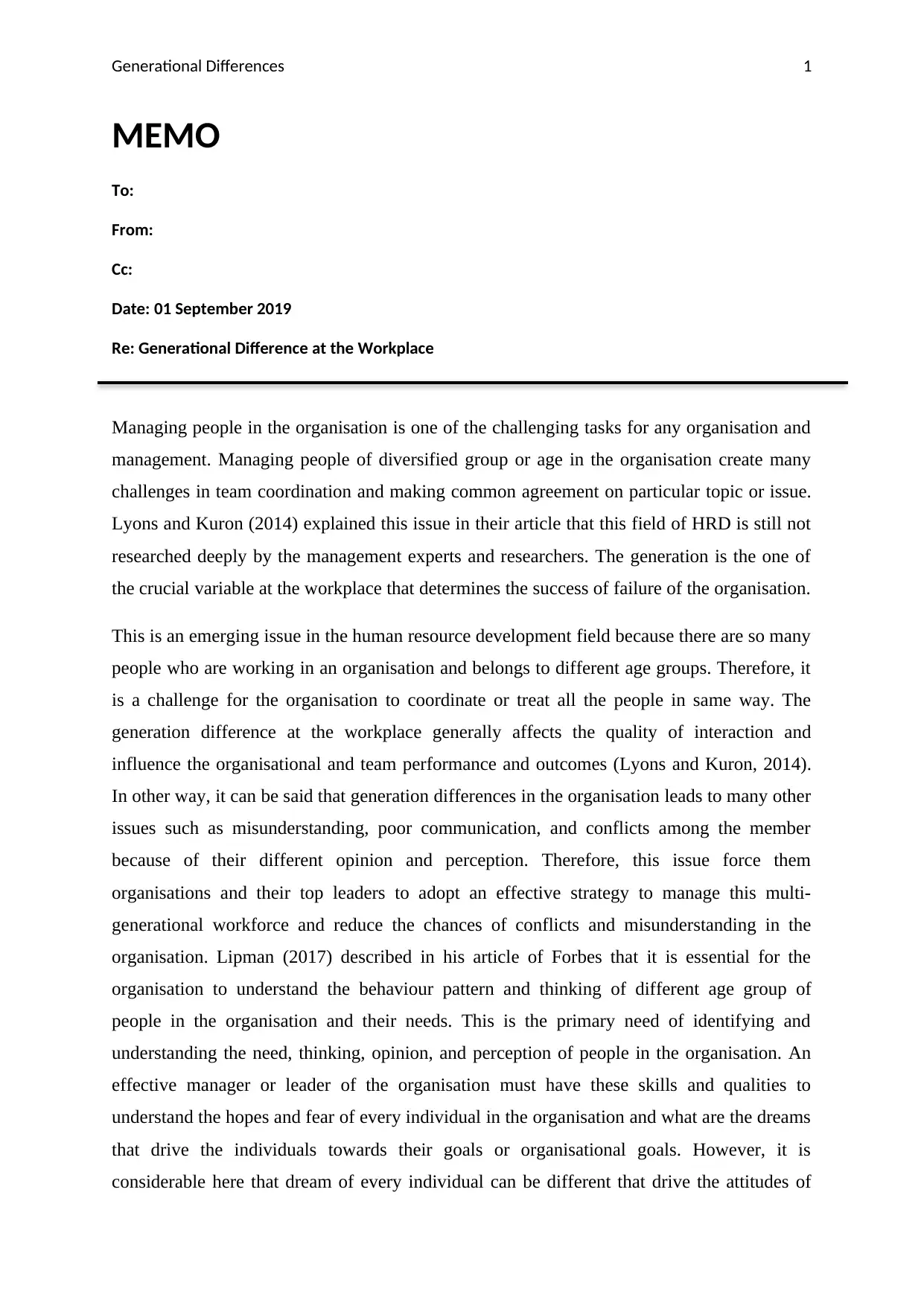
Generational Differences 1
MEMO
To:
From:
Cc:
Date: 01 September 2019
Re: Generational Difference at the Workplace
Managing people in the organisation is one of the challenging tasks for any organisation and
management. Managing people of diversified group or age in the organisation create many
challenges in team coordination and making common agreement on particular topic or issue.
Lyons and Kuron (2014) explained this issue in their article that this field of HRD is still not
researched deeply by the management experts and researchers. The generation is the one of
the crucial variable at the workplace that determines the success of failure of the organisation.
This is an emerging issue in the human resource development field because there are so many
people who are working in an organisation and belongs to different age groups. Therefore, it
is a challenge for the organisation to coordinate or treat all the people in same way. The
generation difference at the workplace generally affects the quality of interaction and
influence the organisational and team performance and outcomes (Lyons and Kuron, 2014).
In other way, it can be said that generation differences in the organisation leads to many other
issues such as misunderstanding, poor communication, and conflicts among the member
because of their different opinion and perception. Therefore, this issue force them
organisations and their top leaders to adopt an effective strategy to manage this multi-
generational workforce and reduce the chances of conflicts and misunderstanding in the
organisation. Lipman (2017) described in his article of Forbes that it is essential for the
organisation to understand the behaviour pattern and thinking of different age group of
people in the organisation and their needs. This is the primary need of identifying and
understanding the need, thinking, opinion, and perception of people in the organisation. An
effective manager or leader of the organisation must have these skills and qualities to
understand the hopes and fear of every individual in the organisation and what are the dreams
that drive the individuals towards their goals or organisational goals. However, it is
considerable here that dream of every individual can be different that drive the attitudes of
MEMO
To:
From:
Cc:
Date: 01 September 2019
Re: Generational Difference at the Workplace
Managing people in the organisation is one of the challenging tasks for any organisation and
management. Managing people of diversified group or age in the organisation create many
challenges in team coordination and making common agreement on particular topic or issue.
Lyons and Kuron (2014) explained this issue in their article that this field of HRD is still not
researched deeply by the management experts and researchers. The generation is the one of
the crucial variable at the workplace that determines the success of failure of the organisation.
This is an emerging issue in the human resource development field because there are so many
people who are working in an organisation and belongs to different age groups. Therefore, it
is a challenge for the organisation to coordinate or treat all the people in same way. The
generation difference at the workplace generally affects the quality of interaction and
influence the organisational and team performance and outcomes (Lyons and Kuron, 2014).
In other way, it can be said that generation differences in the organisation leads to many other
issues such as misunderstanding, poor communication, and conflicts among the member
because of their different opinion and perception. Therefore, this issue force them
organisations and their top leaders to adopt an effective strategy to manage this multi-
generational workforce and reduce the chances of conflicts and misunderstanding in the
organisation. Lipman (2017) described in his article of Forbes that it is essential for the
organisation to understand the behaviour pattern and thinking of different age group of
people in the organisation and their needs. This is the primary need of identifying and
understanding the need, thinking, opinion, and perception of people in the organisation. An
effective manager or leader of the organisation must have these skills and qualities to
understand the hopes and fear of every individual in the organisation and what are the dreams
that drive the individuals towards their goals or organisational goals. However, it is
considerable here that dream of every individual can be different that drive the attitudes of
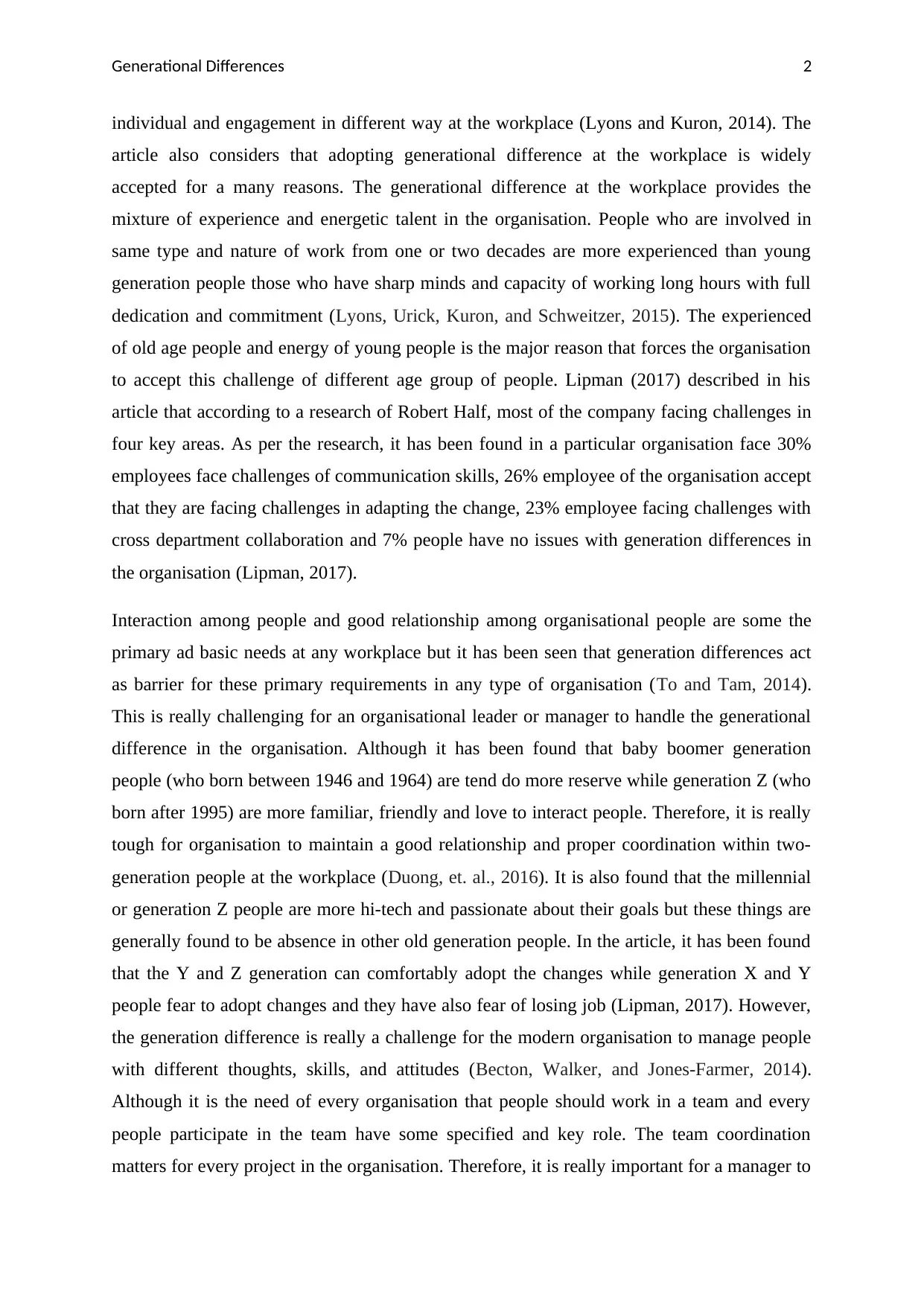
Generational Differences 2
individual and engagement in different way at the workplace (Lyons and Kuron, 2014). The
article also considers that adopting generational difference at the workplace is widely
accepted for a many reasons. The generational difference at the workplace provides the
mixture of experience and energetic talent in the organisation. People who are involved in
same type and nature of work from one or two decades are more experienced than young
generation people those who have sharp minds and capacity of working long hours with full
dedication and commitment (Lyons, Urick, Kuron, and Schweitzer, 2015). The experienced
of old age people and energy of young people is the major reason that forces the organisation
to accept this challenge of different age group of people. Lipman (2017) described in his
article that according to a research of Robert Half, most of the company facing challenges in
four key areas. As per the research, it has been found in a particular organisation face 30%
employees face challenges of communication skills, 26% employee of the organisation accept
that they are facing challenges in adapting the change, 23% employee facing challenges with
cross department collaboration and 7% people have no issues with generation differences in
the organisation (Lipman, 2017).
Interaction among people and good relationship among organisational people are some the
primary ad basic needs at any workplace but it has been seen that generation differences act
as barrier for these primary requirements in any type of organisation (To and Tam, 2014).
This is really challenging for an organisational leader or manager to handle the generational
difference in the organisation. Although it has been found that baby boomer generation
people (who born between 1946 and 1964) are tend do more reserve while generation Z (who
born after 1995) are more familiar, friendly and love to interact people. Therefore, it is really
tough for organisation to maintain a good relationship and proper coordination within two-
generation people at the workplace (Duong, et. al., 2016). It is also found that the millennial
or generation Z people are more hi-tech and passionate about their goals but these things are
generally found to be absence in other old generation people. In the article, it has been found
that the Y and Z generation can comfortably adopt the changes while generation X and Y
people fear to adopt changes and they have also fear of losing job (Lipman, 2017). However,
the generation difference is really a challenge for the modern organisation to manage people
with different thoughts, skills, and attitudes (Becton, Walker, and Jones‐Farmer, 2014).
Although it is the need of every organisation that people should work in a team and every
people participate in the team have some specified and key role. The team coordination
matters for every project in the organisation. Therefore, it is really important for a manager to
individual and engagement in different way at the workplace (Lyons and Kuron, 2014). The
article also considers that adopting generational difference at the workplace is widely
accepted for a many reasons. The generational difference at the workplace provides the
mixture of experience and energetic talent in the organisation. People who are involved in
same type and nature of work from one or two decades are more experienced than young
generation people those who have sharp minds and capacity of working long hours with full
dedication and commitment (Lyons, Urick, Kuron, and Schweitzer, 2015). The experienced
of old age people and energy of young people is the major reason that forces the organisation
to accept this challenge of different age group of people. Lipman (2017) described in his
article that according to a research of Robert Half, most of the company facing challenges in
four key areas. As per the research, it has been found in a particular organisation face 30%
employees face challenges of communication skills, 26% employee of the organisation accept
that they are facing challenges in adapting the change, 23% employee facing challenges with
cross department collaboration and 7% people have no issues with generation differences in
the organisation (Lipman, 2017).
Interaction among people and good relationship among organisational people are some the
primary ad basic needs at any workplace but it has been seen that generation differences act
as barrier for these primary requirements in any type of organisation (To and Tam, 2014).
This is really challenging for an organisational leader or manager to handle the generational
difference in the organisation. Although it has been found that baby boomer generation
people (who born between 1946 and 1964) are tend do more reserve while generation Z (who
born after 1995) are more familiar, friendly and love to interact people. Therefore, it is really
tough for organisation to maintain a good relationship and proper coordination within two-
generation people at the workplace (Duong, et. al., 2016). It is also found that the millennial
or generation Z people are more hi-tech and passionate about their goals but these things are
generally found to be absence in other old generation people. In the article, it has been found
that the Y and Z generation can comfortably adopt the changes while generation X and Y
people fear to adopt changes and they have also fear of losing job (Lipman, 2017). However,
the generation difference is really a challenge for the modern organisation to manage people
with different thoughts, skills, and attitudes (Becton, Walker, and Jones‐Farmer, 2014).
Although it is the need of every organisation that people should work in a team and every
people participate in the team have some specified and key role. The team coordination
matters for every project in the organisation. Therefore, it is really important for a manager to
⊘ This is a preview!⊘
Do you want full access?
Subscribe today to unlock all pages.

Trusted by 1+ million students worldwide
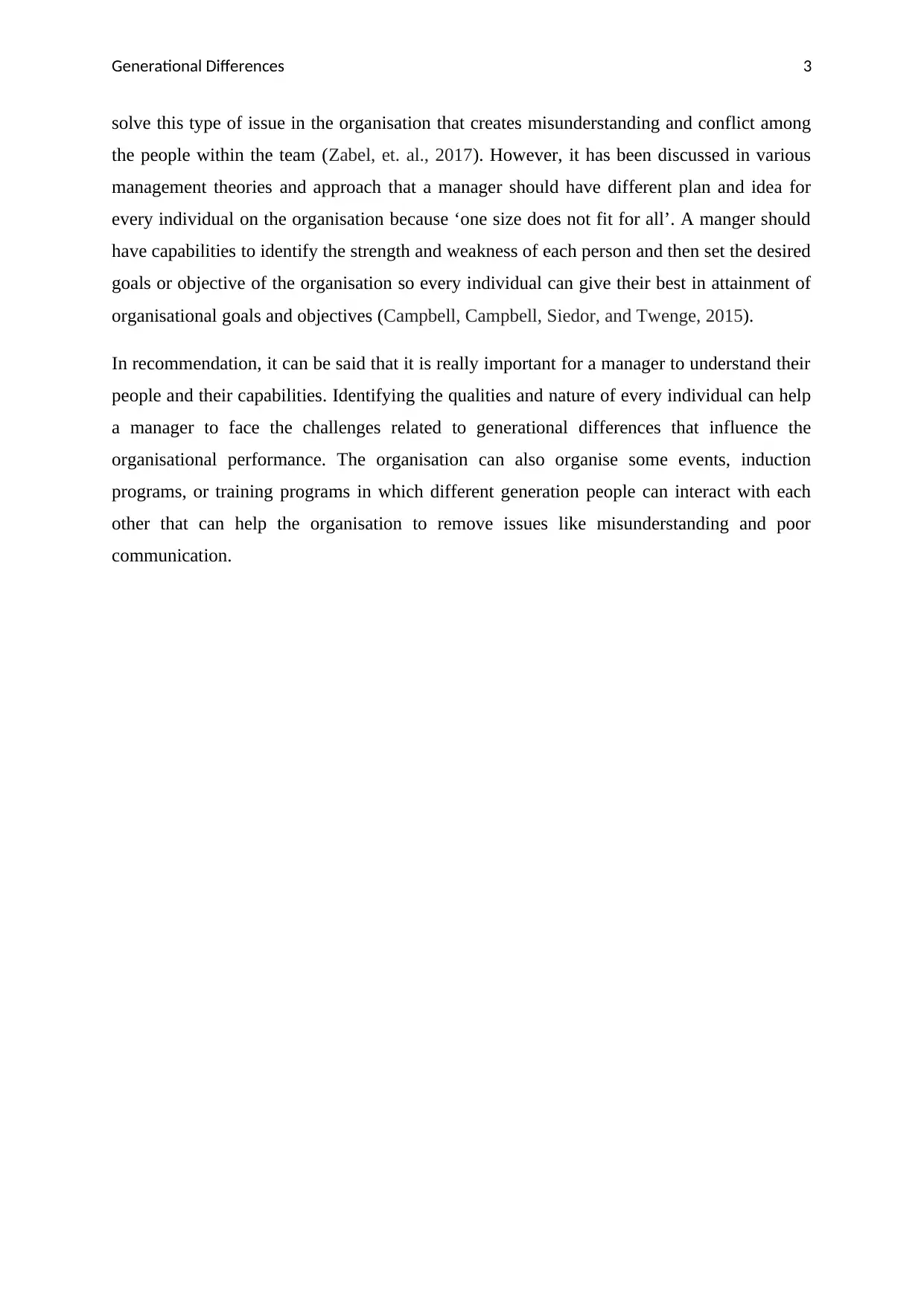
Generational Differences 3
solve this type of issue in the organisation that creates misunderstanding and conflict among
the people within the team (Zabel, et. al., 2017). However, it has been discussed in various
management theories and approach that a manager should have different plan and idea for
every individual on the organisation because ‘one size does not fit for all’. A manger should
have capabilities to identify the strength and weakness of each person and then set the desired
goals or objective of the organisation so every individual can give their best in attainment of
organisational goals and objectives (Campbell, Campbell, Siedor, and Twenge, 2015).
In recommendation, it can be said that it is really important for a manager to understand their
people and their capabilities. Identifying the qualities and nature of every individual can help
a manager to face the challenges related to generational differences that influence the
organisational performance. The organisation can also organise some events, induction
programs, or training programs in which different generation people can interact with each
other that can help the organisation to remove issues like misunderstanding and poor
communication.
solve this type of issue in the organisation that creates misunderstanding and conflict among
the people within the team (Zabel, et. al., 2017). However, it has been discussed in various
management theories and approach that a manager should have different plan and idea for
every individual on the organisation because ‘one size does not fit for all’. A manger should
have capabilities to identify the strength and weakness of each person and then set the desired
goals or objective of the organisation so every individual can give their best in attainment of
organisational goals and objectives (Campbell, Campbell, Siedor, and Twenge, 2015).
In recommendation, it can be said that it is really important for a manager to understand their
people and their capabilities. Identifying the qualities and nature of every individual can help
a manager to face the challenges related to generational differences that influence the
organisational performance. The organisation can also organise some events, induction
programs, or training programs in which different generation people can interact with each
other that can help the organisation to remove issues like misunderstanding and poor
communication.
Paraphrase This Document
Need a fresh take? Get an instant paraphrase of this document with our AI Paraphraser
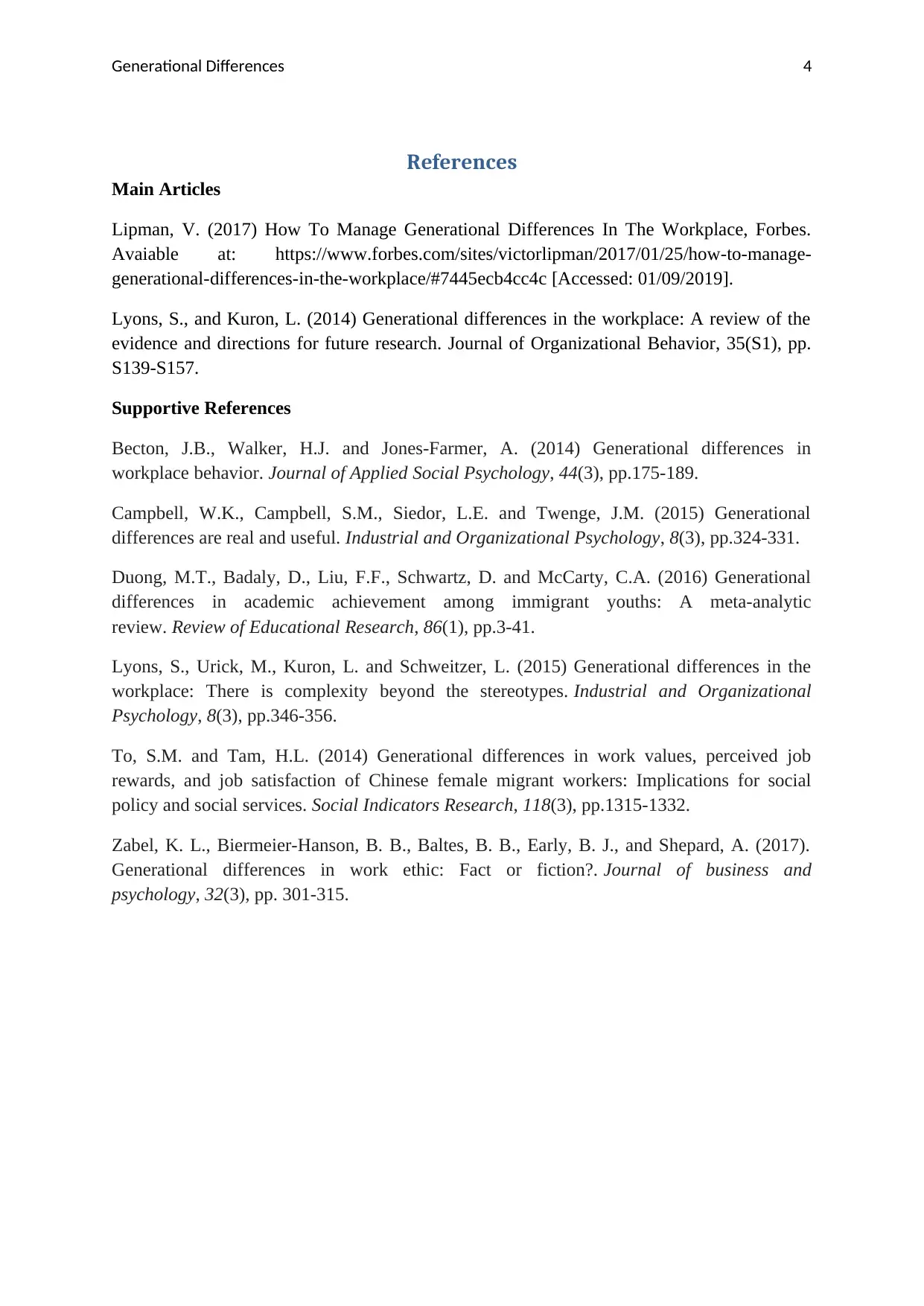
Generational Differences 4
References
Main Articles
Lipman, V. (2017) How To Manage Generational Differences In The Workplace, Forbes.
Avaiable at: https://www.forbes.com/sites/victorlipman/2017/01/25/how-to-manage-
generational-differences-in-the-workplace/#7445ecb4cc4c [Accessed: 01/09/2019].
Lyons, S., and Kuron, L. (2014) Generational differences in the workplace: A review of the
evidence and directions for future research. Journal of Organizational Behavior, 35(S1), pp.
S139-S157.
Supportive References
Becton, J.B., Walker, H.J. and Jones‐Farmer, A. (2014) Generational differences in
workplace behavior. Journal of Applied Social Psychology, 44(3), pp.175-189.
Campbell, W.K., Campbell, S.M., Siedor, L.E. and Twenge, J.M. (2015) Generational
differences are real and useful. Industrial and Organizational Psychology, 8(3), pp.324-331.
Duong, M.T., Badaly, D., Liu, F.F., Schwartz, D. and McCarty, C.A. (2016) Generational
differences in academic achievement among immigrant youths: A meta-analytic
review. Review of Educational Research, 86(1), pp.3-41.
Lyons, S., Urick, M., Kuron, L. and Schweitzer, L. (2015) Generational differences in the
workplace: There is complexity beyond the stereotypes. Industrial and Organizational
Psychology, 8(3), pp.346-356.
To, S.M. and Tam, H.L. (2014) Generational differences in work values, perceived job
rewards, and job satisfaction of Chinese female migrant workers: Implications for social
policy and social services. Social Indicators Research, 118(3), pp.1315-1332.
Zabel, K. L., Biermeier-Hanson, B. B., Baltes, B. B., Early, B. J., and Shepard, A. (2017).
Generational differences in work ethic: Fact or fiction?. Journal of business and
psychology, 32(3), pp. 301-315.
References
Main Articles
Lipman, V. (2017) How To Manage Generational Differences In The Workplace, Forbes.
Avaiable at: https://www.forbes.com/sites/victorlipman/2017/01/25/how-to-manage-
generational-differences-in-the-workplace/#7445ecb4cc4c [Accessed: 01/09/2019].
Lyons, S., and Kuron, L. (2014) Generational differences in the workplace: A review of the
evidence and directions for future research. Journal of Organizational Behavior, 35(S1), pp.
S139-S157.
Supportive References
Becton, J.B., Walker, H.J. and Jones‐Farmer, A. (2014) Generational differences in
workplace behavior. Journal of Applied Social Psychology, 44(3), pp.175-189.
Campbell, W.K., Campbell, S.M., Siedor, L.E. and Twenge, J.M. (2015) Generational
differences are real and useful. Industrial and Organizational Psychology, 8(3), pp.324-331.
Duong, M.T., Badaly, D., Liu, F.F., Schwartz, D. and McCarty, C.A. (2016) Generational
differences in academic achievement among immigrant youths: A meta-analytic
review. Review of Educational Research, 86(1), pp.3-41.
Lyons, S., Urick, M., Kuron, L. and Schweitzer, L. (2015) Generational differences in the
workplace: There is complexity beyond the stereotypes. Industrial and Organizational
Psychology, 8(3), pp.346-356.
To, S.M. and Tam, H.L. (2014) Generational differences in work values, perceived job
rewards, and job satisfaction of Chinese female migrant workers: Implications for social
policy and social services. Social Indicators Research, 118(3), pp.1315-1332.
Zabel, K. L., Biermeier-Hanson, B. B., Baltes, B. B., Early, B. J., and Shepard, A. (2017).
Generational differences in work ethic: Fact or fiction?. Journal of business and
psychology, 32(3), pp. 301-315.
1 out of 5
Related Documents
Your All-in-One AI-Powered Toolkit for Academic Success.
+13062052269
info@desklib.com
Available 24*7 on WhatsApp / Email
![[object Object]](/_next/static/media/star-bottom.7253800d.svg)
Unlock your academic potential
Copyright © 2020–2026 A2Z Services. All Rights Reserved. Developed and managed by ZUCOL.





